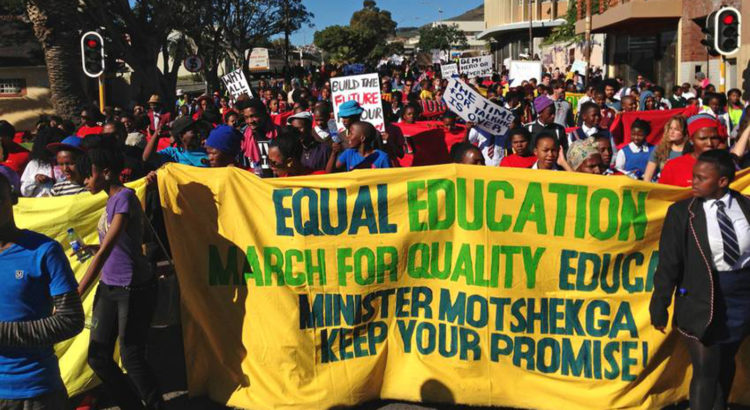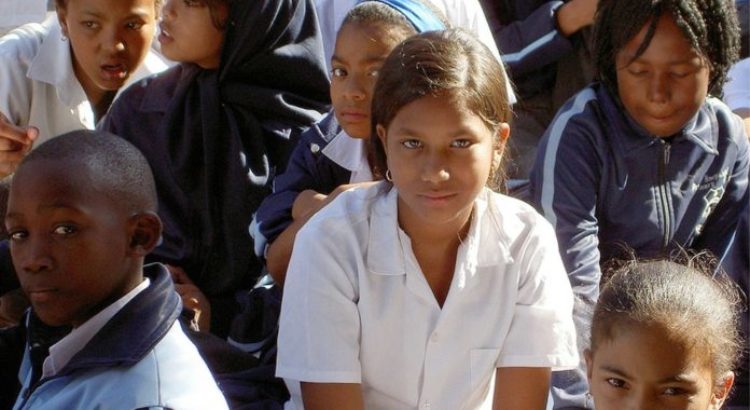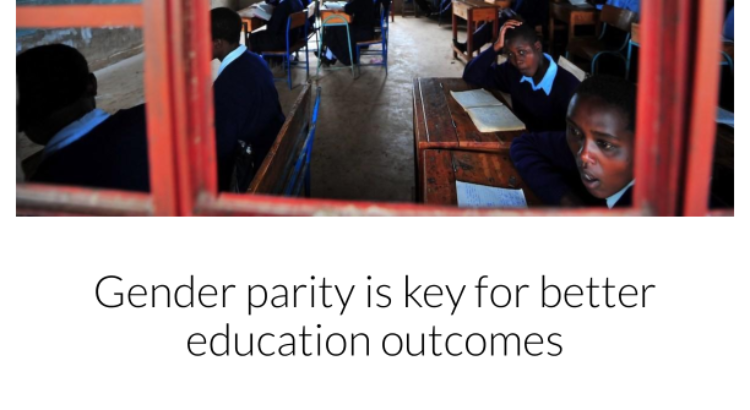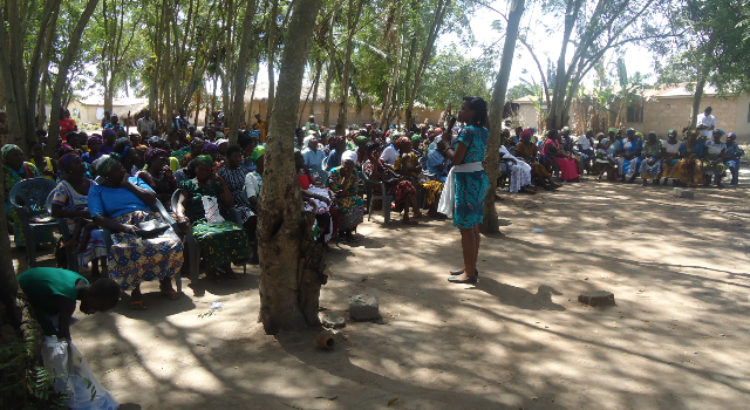By: dailymaverick.co.za/04-07-2018
The civic movement Equal Education has begun its third National Congress on the back of recent damaging sexual harassment scandals and allegations of a cover-up. On its opening day, it hosted a panel discussion about creating a safe space for young girls and women.
Equal Education (EE), the civil society organisation which advocates for equal access to quality education and reforms of South Africa’s education system hosted a panel discussion on intersectionality at the opening day of its third National Congress to engage with pupils about creating a safe space for girls and women.
A group of delegates from five provinces (KwaZulu-Natal, Limpopo, Eastern Cape, Western Cape and Gauteng) comprised mostly of high school pupils, teachers, parents and education activists, gathered at the Linder Auditorium 0n Wits Education Campus in Parktown on Monday night.
Panellists Letlhogonolo Mokgoroane from Sonke Gender Justice, Simamkele Dlakavu, a #feesmustfall activist, Zandile Motsoeneng, a feminist activist, and Londokuhle Mnguni, a high school volunteer, had a challenging time on stage responding to questions posed by high school pupils.
Ever since the sexual harassment allegations levelled against Equal Education’s co-founder and treasurer Doron Isaacs and other members, the movement has undergone “a lot of self-introspection”, Deputy General secretary, Ntuthuzo Ndzomo told Daily Maverick at the conference.
Isaacs quit following the allegations — but said it was not an admission of guilt — and an inquiry is under way.
According to Ndzomo, since the beginning of the investigations into sexual harassment began, branches have been looking at preventative measures for the future.
Former General Secretary Tshepo Motsepe has also been accused of harassment and an internal investigation is under way. Motsepe resigned and, like Isaacs, he denied the allegations. Also under a cloud was national organiserLuyolo Mazwembe, who was found guilty of sexual harassment in an internal inquiry and was dismissed.
Subsequent accusations were also directed at prominent activist Zackie Achmat, with claims of a cover-up of numerous cases of harassment. Achmat has defended himself against the public attack, and an investigation is also under way.
At the discussion, Motsoeneng said that as a society we had lost the spirit of ubuntu, the idea that another person’s struggle is also your own. This concept was a foundational idea of intersectionality, he said.
“There is no such thing as a single issue struggle, because no one lives single issue lives,” said Motsoeneng, quoting feminist US author Audre Lorde.
A high school student, who identified herself as Dimakatso, asked the panel how society could be taught to create and promote intersectional spaces that are safe for women and people with disabilities.
For Dlakavu, intersectionality meant placing women in positions of power with programmes and policies that would make society prioritise women’s issues with regards to equal pay and ensuring the supply of sanitary pads.
Londokuhle Mnguni, an EE equaliser (post-school volunteer and activist) remarked on how pupils were not informed about what sexual harassment was. For her, the first thing that came to mind was rape, although that is not the full scope of harassment. As pupils, had they been given information and also educated about this — even cat-calling on the street is considered sexual harassment.
“The fact that we could not define sexual harassment meant that we would allow it to happen,” said Mnguni.
Another student commented on how cat-calling for him was something he learnt from his elders back at home when growing up. He was taught that it was a sign that you acknowledge and appreciate the beauty of a woman as she passes by on the street.
Mnguni then replied how uncomfortable women feel when passing a street corner as men stand and stare. Furthermore, she noted how if their advances are rejected they usually hurled insults at women.
“Your teaching (at home) is infringing on the rights of another. Put yourself in the shoes of a woman who gets whistled at, something that is often done to a dog,” said Mnguni.
The discussion became heated when Tato Masilela, a high school pupil remarked how intersectionality could be unfair, especially when an incompetent woman was put in a position of leadership. As an example, he cited Social Development Minister Bathabile Dlamini, who is accused of mismanaging the Sassa grant payment system.
Mokgoroane then replied that the standards placed on black women is not the same as those placed on black men. “Who determines who is competent,” said Mokgoroane, “There are a lot of mediocre black men allowed to do things without being called incompetent.”
Some pupils sat on the fence with regards to allegations of sexual harassment levelled at their mentors and teachers.
Nthabiseng Phuka, a facilitator and recent matriculant, recalled the impact that Tshepo Motsepe, who is currently under investigation for harassment, had had on her since she joined Equal Education.
“He taught me a lot about politics and never used his power on us when he was our facilitator,” said Phuka.
Zanele Magumasholo, a Grade 10 pupil who recently joined EE, said that public perception was such that the issue (of harassment) was with the movement as a whole. She notes that although it was senior leaders involved, these were isolated cases.
“We cannot as yet say that they are guilty, we are still waiting for feedback from the inquiry — it might not be true. There has been nothing concrete yet. If it is true then we will acknowledge it and deal with it,” said Magumasholo.
“People have been asking us questions about how to build from this aftermath,” said Ndzomo, “there are some who think we have something to hide and are distancing themselves because we took time to release a statement on Tshepo Motsepe, whereas we were still consulting all relevant parties.”
The priority, said Ndzomo, wasto make sure that the process was credible and to protect the complainants.
Equal Education has toldDaily Maverickthat they have acquired the assistance of a law firm to assist their inquiries. The law firm has been tasked with drafting terms of reference and approaching lawyers and judges to be potential panelists.
In a statement released last month, EE said that strict sexual harassment policies were in place and that EE had acted swiftly to address “every sexual harassment allegation” before it.
EE has now established three separate processes:
- One independent panel will look into allegations of sexual harassment levelled against Motshepe. The panel may investigate any other matter that arises as part of the process or refer it to the broader assessment process mentioned below.
- A second independent panel will investigate sexual harassment allegations against Isaacs.
- EE’s National Council has also resolved to establish a broader assessment process, which will examine EEs record of dealing with mistreatment in the workplace, as well as EE’s policies, procedures and organisational culture in regard to harassment, and powerdynamics.
*Fuente: https://www.dailymaverick.co.za/article/2018-07-03-equal-education-looks-to-the-future-in-the-wake-of-sexual-harassment-scandal/#.WzwXIyPhC_E
 Image copyrightGETTY IMAGES
Image copyrightGETTY IMAGES















 Users Today : 1
Users Today : 1 Total Users : 35460458
Total Users : 35460458 Views Today : 1
Views Today : 1 Total views : 3419296
Total views : 3419296